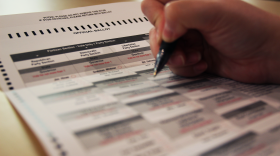
Statewide campaigns to get various questions on the 2026 general election ballot in Michigan have already begun collecting signatures. That includes three proposed state constitutional amendments that say they’re using only volunteers to canvass at the moment.
One of those campaigns, Invest in MI Kids, would tax Michiganders more if they make at least $500,000 a year as a single filer, or $1 million annually on jointly filed tax returns.
Extra revenue collected would go toward the state’s School Aid Fund.
Supporters say that money would have to go toward career training, shrinking class sizes, and teacher retention.
Critics, however, claim ballot language isn't clear enough on that. Those concerns caused a state elections board to deadlock on whether to approve summary language to appear at the top of the petition.
The campaign chalked that up to politics. Despite the setback, it’s kicking off its signature gathering this weekend.
Imani Foster, with the Invest in MI Kids coalition, said there are already 500 trained volunteers with almost 1,000 signed up in total. Foster expects them to be active.
“It’s not just getting it on the ballot. It’s also getting people to vote yes. So, we’re also spreading awareness the more we get people to sign this petition. And so. you should plan to see us pretty much everywhere across the state, at rallies, at all those kinds of things,” Foster said.
Foster said the campaign is shooting to collect around 700,000 signatures, around 250,000 more than what’s required to make the ballot.
Invest in MI Kids is starting its 180-day signature gathering window around a month later than the Rank MI Choice coalition, which appeared before the Michigan Board of State Canvassers at the same meeting in June.
Rank MI Choice, however, didn’t face the same extended setbacks when it came to summary language approval and was able to get going sooner. The group said it’s received a warm response so far for its petition that would allow Michiganders to rank their candidate choices for federal campaigns and certain statewide offices like governor, attorney general, and secretary of state -- a system called ranked-choice voting.
Campaign director Joe Spaulding said the campaign has doubled its number of volunteers every 30 days over the last three months.
“We’re having a lot of young people who have felt particularly trapped by the current system and their lack of choices signing up, not just to circulate the petition but thanking us for being available to them as an option, and then signing up to volunteer,” Spaulding said.
Critics of the campaign argue ranked-choice voting could lead to backroom dealmaking among campaigns to share supporters.
Organizers say it gives people a chance to vote for the candidates they believe in, rather than the candidates they could live with.
Ranked-choice voting notably was used in New York City’s recent mayoral primary elections.
While Invest in MI Kids and Rank MI Vote are just getting started, a long-running effort to get rid of all property taxes in Michigan says it’s about halfway through its months-long quest to get the question before voters.
The Ax MI Tax campaign started canvassing in April and says it’s working with an all-volunteer team of around 2,000 people.
Founder Karla Wagner said she believes everything’s on track, despite working with relatively few resources.
“It’s a purely grass roots effort and volunteers. So, running a statewide campaign with volunteers at a grassroots level with very little money, that’s the challenge, but we’re doing what we can to get it out there and get it done,” Wagner said.
The campaign has faced criticism because cutting property taxes could hurt the things they fund like libraries, parks, and emergency services.
Supporters say the petition would replace some of that funding with state money to keep essential government and infrastructure working.
Other statewide campaigns in the works include efforts to tighten the state’s voter ID laws and undo state laws passed in February that have implications for minimum wage and guaranteed sick leave policies.
CORRECTION: An earlier version of this story said Invest in MI Kids would tax individuals filers if they made more than $500 million dollars a year. The correct number is 500-thousand dollars a year.






